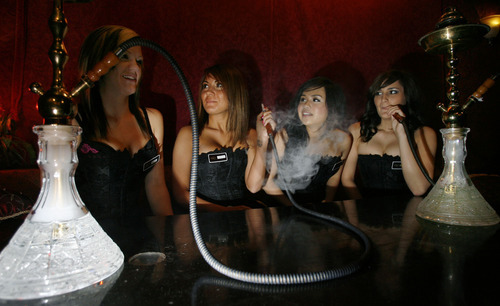This is an archived article that was published on sltrib.com in 2012, and information in the article may be outdated. It is provided only for personal research purposes and may not be reprinted.
The Huka Bar & Grill will likely win at least a five-year reprieve from a bill that would have forced it to shut its doors and put 90 employees out of work.
The business will probably have to close a restaurant and lounge connected to the bar, which will likely cost 15 employees their jobs, because a deal struck on HB245 will allow hookah pipes only in businesses with a full liquor license.
It's not an ideal situation, says Nathan Porter, whose family opened the Huka Bar in Murray in 2005, but it is better than the death sentence the bar originally faced and offers the chance that the five-year window could be extended in 2017.
"I'm going to support the bill," Porter said Friday. "I'm still here. I'm going to be able to stay in business. My expectations are that it's going to be able to be extended."
The Huka Bar had fallen into a gray area in the Utah Indoor Clean Air Act, which bans igniting tobacco in public places. Hookah pipes and electronic cigarettes heat the tobacco to produce vapors, but it doesn't ignite, meaning Porter and others argued the law didn't apply.
That meant that hookahs or e-cigarettes could be used in any public place. As Rep. Brad Last, the sponsor of HB245, said during a hearing on his proposal last week, people could light an e-cigarette on a public bus, or bring their hookahs to the rotunda of the Capitol and it would be perfectly legal.
The Utah Department of Health had adopted a rule in August to apply the ban to hookahs and e-cigarettes, but agreed to postpone enforcing the rule until the Legislature weighed in.
Last wanted to ban hookahs and e-cigarettes immediately, but the bill stalled when lawmakers resisted shutting down the Huka Bar and idling 90 workers in a down economy.
Last offered the bar a three-year exemption; Porter argued for 15 years and after hours of sometimes tense negotiations last week, Last agreed to the five-year grace period, which will be reassessed in 2017.
"I think this is as good as we can do," said Last. "When you get into these kinds of issues, you're kind of caught between trying to establish the policy you feel good about and trying to find a reasonable approach."
Porter said he doesn't disagree that there are places where hookahs shouldn't be used, and this bill will cover those.
"[With HB245] we've kept hookah out of day cares and Chuck E. Cheeses. We're keeping e-cigarettes off TRAX," Porter said.
People going to the Huka Bar, however, know there will be hookahs, Porter said. It is a private club, and patrons have to read a surgeon general's warning and sign a waiver when they enter the bar.
"You're basically taking people's personal freedoms away" by banning hookahs, he said.
While Porter is on board with the new bill, Jason Cornfeld, who owns ElectronicStix, an e-cigarette shop in Ogden that opened in 2008, said it would be a blow to his business.
"I'm not really OK with it," he said. "I'll go down there when they go before the committee and still fight."
Cornfeld's shop has a "vaping" lounge attached to the store, where customers can use the "juice" they buy for their e-cigarettes. That would have to go.
And Cornfeld currently demonstrates to new customers how the E-cigarettes work. He would have to use a liquid without nicotine for the demonstrations if the law passes.
"It's going to impact how we do business and it's going to be a little harder to demonstrate things," said Cornfeld.
It's an inconvenience that is unnecessary, he said, since he argues e-cigarettes are safe to use and there is no reason to ban them from public places.
"They're claiming there's never been any studies done, but there are studies all over the world," he said. "Basically, standing around in Salt Lake City and breathing the air is worse for you."
Cornfeld had been looking at opening a new store in Murray with a lounge and pool tables. But he said the legislation will probably scrap those plans or at least scale them back.
The revised bill is being drafted by legislative attorneys and could go before a committee this week.
Twitter: @RobertGehrke





